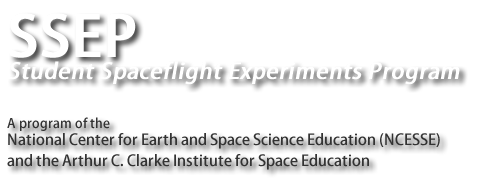There are now many community leaders who are interested in bringing SSEP to their community, and are actively approaching potential funders. In many cases, these funders were identified when the SSEP Team provided a tutorial on easy-to-navigate online funding databases that can do a search for funders in a particular state or locale. See THIS SSEP Blog Post for details.
We recently received multiple requests for a list of talking point bullets that could be used when approaching a funder. Here is a by no means complete list that should help. If you see we’ve missed important bullets, please outline them in a comment below.
Bulleted list of talking points for SSEP when talking to a funder, or for that matter,
any potential stakeholder you are interested in bringing aboard:
Truly HISTORIC opportunity to get students across our district excited about science through community-wide immersion:
1. an experiment design challenge allowing students the ability to propose a REAL experiment to fly aboard the last scheduled space shuttle flight – Shuttle Endeavour in Feb 2011, using an easy-to-use mini-laboratory where half the 90 experiment slots are dedicated for researchers’ use, and half to student experiments.
2. Participation means that an experiment slot is reserved for our community on STS-134.
3. The competition is placed within the context of **community-wide** programming to engage grade 5-12 students, their teachers, and their families – it is a Learning Community Model for STEM Education. See: http://ncesse.org/about/learning-community-model/
4. The programming includes:
- a custom website to provide full and ongoing coverage of SSEP in our community, where we have oversight of content and update;
- weekly Tweet-ups for all our students with scientists and engineers;
- student voices of mission control providing internet coverage from pre-flight to landing;
- the winning team’s ability to travel down to Kennedy Space Center to deliver their experiment samples, and be there on the Shuttle’s return for harvesting;
- a conference in Washington, DC where our student teams can do presentation on their experiment designs, hear featured speakers on science, engineering and education, and have tours of the National Air and Space Museum; and
- a National Team of scientists and engineers coming to our community for a week to talk to 2,000-4,000 students one classroom at a time, and conduct family and public programming.
5. This is a wonderful, comprehensive program in science and technology education to engage our entire community, and demonstrate that science is fun, done by ordinary people like you and me, and is reflective of a personal and emotional journey of exploration and learning. This is nothing short of a celebration of learning for our entire community.
6. We want some of the next generation of America’s scientists and engineers to come from our community. It is in the best interest of our community, our state, and our nation.
7. District Strategic Goals addressed by SSEP (some possible examples):
- expose and immerse both teachers and students in real science: including experiment design, writing a proposal, the review process, participating in a science conference, and communicating their design approaches at that conference
- implement a systemic STEM program across the community, and one that is high profile, garnering significant public and local media attention, thereby showcasing STEM
- engage families and the public
- have thousands of our students meet and talk to real scientists
- introduce use of social media for real education, a requirement of the 21st century
- give our students true ownership in science
- use SSEP to establish a community coalition of stakeholders in STEM education as a stepping stone to other systemic, high profile programs in STEM
Relevant site links:
SSEP Home Page: http://ssep.ncesse.org
Suite of Program Resources surrounding Experiment Design Competition: http://ssep.ncesse.org/community-program/
The straightforward Mini-Lab to be used: http://ssep.ncesse.org/sts134-flight-experiment/mda/
Learning Community Model: http://ncesse.org/about/learning-community-model/
Embraced Pedagogy, and Scientists and Engineers as Heroes and Role Models: http://ncesse.org/about/embraced-pedagogy/
An Essay on STEM Education and America’s future from NCESSE Center Director Jeff Goldstein: http://www.huffingtonpost.com/jeff-goldstein/the-return-of-atlantis-pr_b_381917.html

Comments are closed.